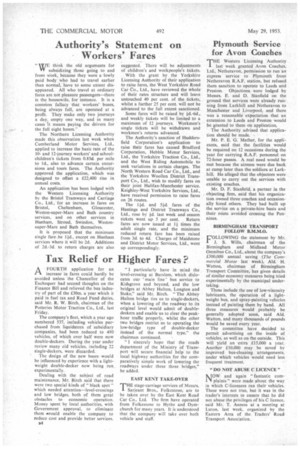Plymouth Service for Avon Coaches
Page 38

If you've noticed an error in this article please click here to report it so we can fix it.
THE Western Licensing Authority last week granted Avon Coaches, Ltd„ Netheravon, permission to run an express service to Plymouth from Netheravon R.A.F. station, but refused them sanction to operate to Leeds and Preston. Objections were lodged by Messrs. F.. and D. Stanfield on the ground that services were already running from Larkhill and Netheravon to Manchester and Liverpool, and there was a reasonable expectation that an extension to Leeds and Preston would be granted to them on application.
The Authority advised that application should be made.
Mr. P. E. G. Mather, for the applicants, said that the facilities would be required on 12 occasions during the year for carrying R.A.F. personnel on 72-hour passes. A real need would be met because the airmen were due back at camp later than the soldiers at Larkhill. He alleged that the objectors were unable to carry out the services with existing coaches.
Mr. D. F. Stanfield, a partner in the objecting firm, said that his organization owned three coaches and occasionally hired others. They had built up the service on a private-hire basis and their route avoided crossing the Pennines.
BIRMINGHAM TRANSPORT FOLLOW B.M.M.O.
FOLLOWING the statement by Mr. J. S. Wills, chairman of the Birmingham and Midland Motor Omnibus Co., Ltd., about the company's £300,000 annual saving (The Commercial Motor last week), Aid. H. Watton, chairman of Birmingham Transport Committee, has given details of similar economy measures being tried experimentally by the municipal undertaking.
These include the use of low-viscosity lubricants, the operation of a lightweight bus, and spray-painting vehicles instead of painting them by hand. All three measures would probably be generally adopted soon, said Aid. Watton, and many thousands of pounds would be saved every year.
The committee have decided to permit advertising on the inside of vehicles, as well as on the outside. This will yield an extra £15,000 a year. Another £10,000 may be saved by improved bus-cleaning arrangements, under which vehicles would need less frequent treatment.
"DO NOT ABUSE C LICENCE"
NOW and again "fantastic complaints" were made about the way in which C-licensees ran their vehicles. These were not true, but it was in the trader's interests to ensure that he did not abuse the privileges of his C licence. said Mr. T. Anness at a meeting at Luton, last week, organized by the Eastern Area of the Traders' Road Transport Association.




























































































